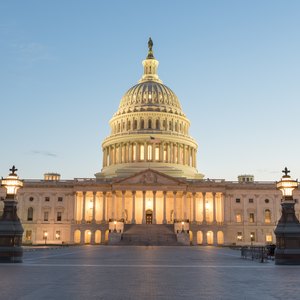
The United States' Constitution grants certain powers to Congress, including the power to coin money, or the currency power. Those powers that are clearly stated are known as express powers. However, additional powers are implied or interpreted from the language of the express powers.
Tips
A variety of implied powers have been utilized by Congress throughout history with respect to currency power. The first use of implied currency power occurred in 1791, when Congress acted to charter the first federal bank.
Creating a Federal Bank
The first use of implied currency power was in 1791, when Congress chartered a federal bank, the Bank of the United States, to pay war debts and create a standard form of paper currency, or bank note. These were exclusive private federal banks, which some argued were a power grab that favored business interests in the eastern part of the country. While many asserted that the bank was unconstitutional, it and the subsequent Second National Bank survived constitutionality tests by the U.S. Supreme Court in 1819 and 1824.
President Andrew Jackson famously shut down the Second National Bank in 1833, seeing it as an unconstitutional handout to big businessmen at the expense of the common people. State banks began to issue their own currencies backed by their own deposits, often with little oversight, leading to a wave of land speculation that came crashing down with the recession known as the Panic of 1837.
Introducing Greenbacks
The next notable use of implied power came in 1861 and 1862, when Congress authorized the issuance of “demand notes” and “United States Notes” to help fund the Civil War. Called “greenbacks” because of their green colored printing material, these notes lacked a date when the government would buy them back and they were interest-free, meaning that a one dollar note was always worth one dollar. This was an important use of implied power, because the express power authorized borrowing money on credit, while these notes functioned more like a federal currency.
Uniform Bank Notes
In the Civil War, people relied on state bank notes, that were unreliable due to bank insolvency, fluctuation of value or were counterfeit. Congress and President Lincoln further expanded the use of implied powers when they created a system of nationally-chartered banks with uniform bank notes to eliminate the unfairness and confusion of state bank-issued notes. These acts of 1863 and 1865 also taxed state chartered bank notes out of existence and effectively created a federal currency.
Ending Gold Backing
Congress and president Franklin D. Roosevelt used the implied powers in 1933 because of inflation problems from the Great Depression. That act authorized the removal of all gold coin, gold bullion and gold certificates, or gold-backed certificates of tender, or notes, requiring that they be turned in for exchange of other forms of legal coin or currency in use.
In essence, this was the beginning of the end of national tender based on gold-backed currency that was formally ended in 1976 by Congress as part of reforms by the International Monetary Fund. Today's currency, formally known as the Federal Reserve Note, is not exchangeable for gold or any other precious metal.
References
- Cornell University Law School: U.S. Constitution, Article I
- Cornell University Law School: Legal Tender Cases, Knox v. Lee. Parker v. Davis
- Financial History Review: The U.S. Constitution and Monetary Powers
- U.S. Department of the Treasury Office of the Comptroller of the Currency: Lincoln and the Founding of the National Banking System
- History.com: Andrew Jackson Shuts Down Second Bank of the U.S.
- Federal Reserve Note - Wikipedia
Writer Bio
John Huddle is an Army veteran with enlisted service as general hospital staff and hospital chaplain's assistant. His career also included stints as a teacher, adjunct faculty, administrator and school psychologist. Twice, Dr. Huddle was a major party nominee for state office. He also served as a director on several nonprofit boards. Today he enjoys consulting and lobbying for underdog causes.

